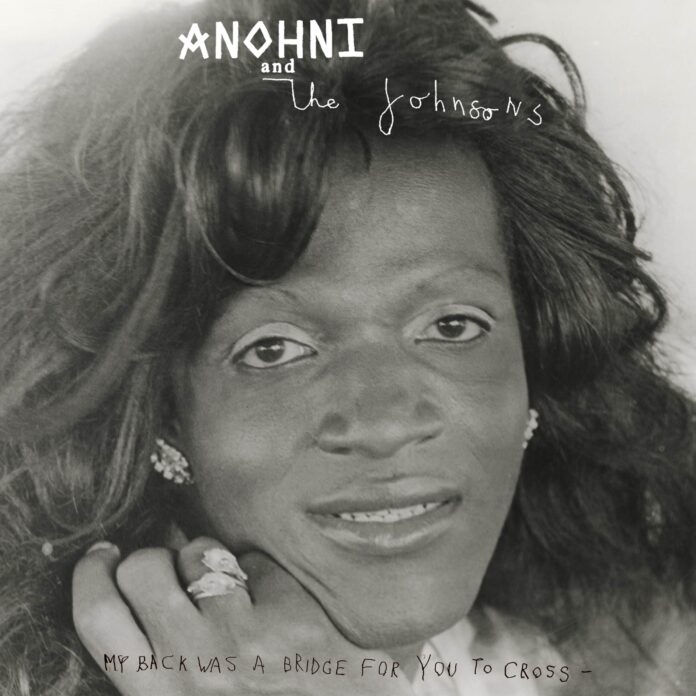The subject matter of Anohni’s songwriting is most often heavy, tragic, and inescapable. Which is why one of the most striking things about My Back Was a Bridge for You to Cross – which follows her 2016 masterpiece HOPELESSNESS and marks her first release bearing the Johnsons moniker in over a decade – is how she’s able to carry it with such remarkable lightness. Co-produced with Jimmy Hogarth, who’s worked with the likes of Amy Winehouse and Duffy, the album contains some of her loosest, most organic, and grounded material to date – terms not usually associated with the artist’s consistent and mountainous acclaim. Guitars chime softly against Anohni’s aching, desperate voice on ‘It Must Change’, which communicates the depths of her grief while flickering in spirit between personal and environmental catastrophe. It’s an urgent cry, but the band is in no rush to get the message across or serve it unambiguously, instead giving shape to the emotion tearing at its very core: “No one’s getting out of here/ That’s why this is so sad.” It works to articulate, without really trying to transform or define, everything that rises out of this – and to guide, stir, and strengthen those who also happen to be passing through the same fragile space.
It’s no coincidence, then, that Anohni’s aspirations and inspirations for the project are both carefully aligned and especially pronounced. By drawing directly from Marvin Gaye’s What’s Going On? and using a portrait of legendary trans activist Marsha P. Johnson – the band’s namesake – as the album cover, she is forcing us to consider the continued pertinence of their revolutionary work and how they might converge, but also how much things have actually changed in half a century. At the same time, she foregrounds her voice in ways that are moving and destabilizing, immersing us into an internal world that’s never stripped from the broader systems and history that pervade it.
It’s not hard to hear this tug-of-war play out in the different layers of the music. There is unassailable beauty in both the melodies and the instrumentation, but these elements are never totally in sync – they buttress and console and contradict without ever quite facing off against each other, even when they seem at odds. Underneath the pure, melancholic singing of ‘It Must Change’ is an illuminating spoken word passage: “You know how they always said that light was the opposite of darkness?/ It’s just fire in darkness, creating life/ So those opposites, they don’t exist/ It’s just an idea that someone told you.”
This idea is one of many of Anohni’s tackles on My Back Was a Bridge for You to Cross, often subtly, sometimes with greater force. The tender, jazz-inflected chords and clean production that anchor ‘Can’t’ accentuate the nuance and empathy of her sharply determined performance, and even as the intensity starts to burn, Rob Moose’s string arrangement is there to offer levity – or gesture gently above. The psychedelic grit of the record is amplified on ‘Rest’, which is both a prayer and a song of unrest, expressing a longing Anohni compares to “a fire of tenderness” as Hogarth’s guitar smolders into the sky. On a couple of songs, though, it becomes untamed and visceral. Her rage splatters over distorted guitar on ‘Go Ahead’, utilizing feedback so uncanny it makes more sense when you discover it’s a sample of a lemur’s song. Then she gives it time to unfurl on the gut-wrenching ‘Scapegoat’, where every bit of violence pierces inward: “I take all of your hate into my flesh and body,” she admits, before the song begins its sweet, absurdly glorious ascent.
On ‘Sliver of Ice’, Anohni pays tribute to her friend and mentor Lou Reed, who in his last days described to her the sensation of an ice cube melting on his tongue. This kind of heightened awareness seems to tie into the relative simplicity of Anohni’s approach on My Back Was a Bridge for You to Cross, even if the path she takes is never quite straightforward. What is the usefulness of appreciating such precious beauty, you wonder? Is physical pleasure inextricable from pain? A quick glance at the track titles reveals that the singer’s frustration contains a fair amount of guilt: ‘It’s My Fault’, ‘There Wasn’t Enough’, ‘Why Am I Alive Now?’. But the way she sings the words on that last track, bearing witness to our world’s suffering, the I is not a far cry from we, which is a little less sad. As she puts it at the very beginning, on ‘It Must Change’: “It’s just gonna be a lonely place for us.”

